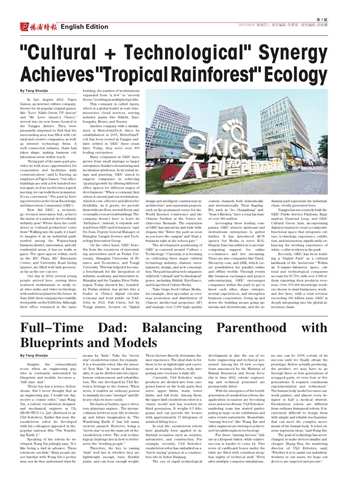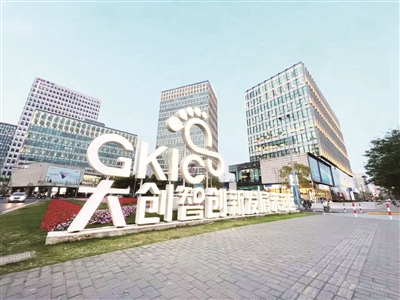By Tang Shunjia
In late August 2021, Paper Games, an internet culture company known for its popular original games like "Love Nikki-Dress UP Queen" and "Mr. Love: Queen's Choice," moved into its new home located in the Yangpu district. They were pleasantly surprised to find that the surrounding area was filled with cultural and creative companies, as well as internet technology firms. A well-connected industry chain had taken shape, making business collaboration seem within reach.
"Being part of the same park provides us with more opportunities for cooperation and facilitates daily communication," said Li Xueting, an employee at Paper Games. "Our office buildings are only a few hundred meters apart, so if we need to have a quick meeting, we can walk there in minutes. It's so convenient." The park Li Xueting referred to is the Great Knowledge and Innovation Community (GKIC).
How did GKIC, a technology-focused innovation hub, achieve the status of a national-level cultural industry gem? Where does the confidence in "cultural production" come from? Walking into the park, it's hard to imagine it as an industrial park: nestled among the Wujiaochang business district, universities, and old residential areas, it has no walls or gates. The open spaces within, such as the KIC Plaza, KIC Enterprise Center, and University Road Living Quarter, are filled with lush greenery as far as the eye can see.
One day in 2014, several young people arrived here, renting three scattered workstations to study real-time audio and video technology, with ambitious plans for the future. In June 2020, their company successfully went public on the NASDAQ. Although their office remained in the same building, the number of workstations expanded from "a few" to "several floors," resulting in multiplied profits.
This company is called Agora, which is a global leader in real-time interactive cloud services, serving industry giants like Bilibili, Xiaohongshu, Momo, and Xiaomi.
Another company with a similar story is MetroDataTech. Since its establishment in 2015, MetroDataTech has been rooted in Yangpu and later settled in GKIC three years later. Today, they serve over 300 leading enterprises.
Many companies in GKIC have grown from small startups to larger enterprises, thanks to its nurturing and incubation attributes. In its initial design and planning, GKIC aimed to support companies in achieving "gradual growth" by offering different office spaces for different stages of development. "When a company first enters, it can rent just one workstation, which is cost-effective and allows for flexibility. As it grows, we provide them with one floor, several floors, and eventually even several buildings. The company doesn't have to leave its 'birthplace'; instead, it expands outward from GKIC until it matures," said Du Juan, Deputy General Manager of Shanghai Yangpu Science and Technology Innovation Group.
On the other hand, GKIC benefits from the resources of surrounding universities such as Fudan University, Shanghai University of Finance and Economics, and Tongji University. This has helped it become a benchmark for the integration of industry, academia, and innovation in Shanghai and the Yangtze River Delta region. Today, Atrenew Inc., founded by Fudan alumni, has grown into a leader in China's digital circular economy and went public on NASDAQ in 2021. Fab-Union, led by Tongji alumni, focuses on "digital design and intelligent construction in architecture" and represents projects such as the permanent venue for the World Internet Conference and the Chinese Pavilion at the Venice Architecture Biennale. The reputation of GKIC has spread far and wide with slogans like "Enter the park as soon as you leave the campus" and "Start a business right at the school gate."
The development positioning of GKIC is centered around "Culture + Technology." Currently, it is focusing on cultivating three major cultural technology industry clusters: entertainment, design, and new consumption. The park has attracted companies with both "cultural" and "technological" genes, including Bilibili, ByteDance, and Grape Seed Culture Media.
Take Grape Seed Culture Media, for example, they specialize in overseas promotion and distribution of Chinese intellectual properties (IP) and manage over 3,000 high-quality content channels both domestically and internationally. Their flagship IPs, such as "Ao Changzhang" and "Sean's Kitchen," have a total fan base of over 580 million.
Leveraging these leading companies, GKIC attracts upstream and downstream enterprises to gather further. It has introduced MCN agency Joy Media to serve KOL. Huayun Data has settled in to provide computing support for online e-commerce and live streaming. There are also companies like Vland, Sheencity.com, and ARK, which create possibilities for parallel online and offline worlds. Through events like business exchanges and project subcontracting, GKIC encourages companies within the park to get to know each other, share entrepreneurial experiences, and strengthen business cooperation. Going up and down the building means going upstream and downstream, and the industrial park represents the industrial chain, vividly presented here.
Yangpu has successively built the GKIC Public Service Platform, Xinjiangwan Diamond Loop, and GKIC Cultural Green Axis, incorporating digital scenarios to create a composite functional space that integrates culture, technology, experience, exhibition, and interaction, significantly enhancing the working experience of white-collar workers in the park.
Recently, GKIC has been building a "Digital Park" as a cultural landmark of the "metaverse." Within an 8-square-kilometer space, cultural and technological companies account for 85.71%, with over 4,500 of them exporting their products overseas. Over 170,000 knowledge workers choose to start businesses, work, and live here, with a total revenue exceeding 300 billion yuan. GKIC is deeply integrating into the global innovation chain.


